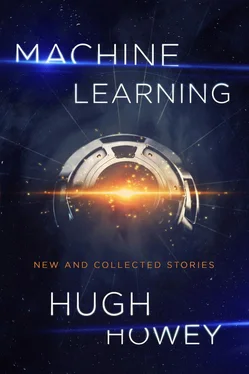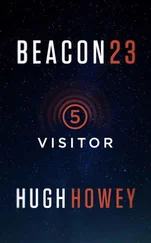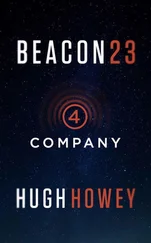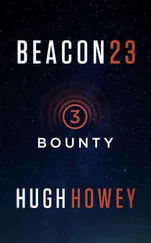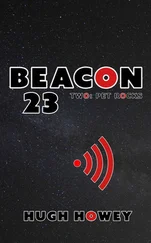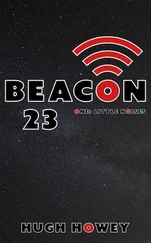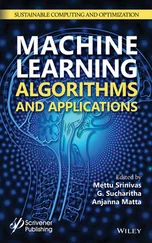“War One has taken a hit!” Rov shouts.
Flashes of light stab in around her, another brightening of the sky. A moment later, there is a deep grumble that I feel in my bones, a noise like the belly growl of a hungry god.
Closer by, a bomb explodes, a sharp crack followed by the howls of my kin. I hear alien craft buzzing overhead, filling the sky with the piercing shrieks of their passing, and with the whistle of loosed munitions.
All is background noise. I am watching the tall grasses wave and wave. Their feathery blades are growing up through the destroyed hull of one of our ships. There is rust here and there, cables chewed by local varmints, all the signs of that universal destroyer: Time. The scars he leaves are everywhere I look.
I hold a tentacle in front of my visor and study it. Where are my scars? Where are the physical artifacts of wounds I remember suffering? Has it really been so long? I search for an old injury that I have been hunting for and have been unable to find for a cycle now. The last thing I remember is waking in my bunk, feeling like someone else. I remember a last glimpse of my ship, dimmed and showing no pockmark, no wear of war.
Another bomb erupts in the distance. More of my people dying. And I think of the stress I witnessed among High Command on my warship. I think of the way things have been falling apart—so many people thrown to Gunnery. There is a girl who will not stop killing herself, a girl who knows something, a fragment of a report about a missing signal from another ship.
There is a helmet by my feet, half-buried in the dirt of planet Earth. Tul is yelling for us to fight, and I am trying to remember a poem I once knew. The words are not with me. All around us are the signs of an invasion that did not succeed. And I know a sudden truth with all the fierceness of a hot blast—I know this as bullets zing by my helmet and bombs rage closer and closer:
We are the second fleet.
We are the reserve.
All that’s left.
And hell has come for us at last.
AFTERWORD
“Second Suicide” came about while daydreaming about the alien invasion trope from the point of view of the aliens. This story has been told so many times. What’s interesting to me is that humans are always the underdogs. Makes sense—if aliens could arrive here in force, they’d be leagues ahead of us in all sorts of warfare-making gizmos. But what if we are more indomitable than we realize? What if we’re not so fragile after all? There are colonies of ants that most humans are wise enough to steer around.
The tension in most good stories comes from the underdog perspective, the hero’s journey. Perhaps alien invasion stories put us at a disadvantage for narrative purposes as much as some primal fear. With “Second Suicide,” I wanted to flip that around. The opening scene hopefully makes the reader care for who is normally the bad guy. And then I tell a story of humans kicking ass, and somehow it becomes a sad tale. The people we normally root for are winning, and even while writing the story, I didn’t know how to feel about this.
It’s difficult to remember that every conflict has two sides. The other side feels just as secure in their position as we do in ours. There’s something to be gained by taking the opposing side as our own, really trying to empathize, imagine the bad guys are the good guys. With their motivations in mind, it becomes more difficult to dehumanize them and easier to understand them. It’s not something that comes easily—but I’m trying.
“Nothing goes to waste.”
I could hear my father’s voice echoing in my mind, always pestering me to do this, not do that, to do it all differently.
Pleasing him may forever prove impossible, but I couldn’t help myself from trying.
He wanted a boy. It was a fact, not something I guessed about or suppressed in my psyche. No, he told me all the time. Usually right after correcting me or pointing out some flaw.
Born small, I stayed that way. Doctor said it was a problem with one of my glands. My dad thought it was gender-related. My theory? Self-preservation. My body had figured out early on that it was a target and best to make itself hard to hit. Stupid theory, I know, but it helps to think it.
You get picked on for being small long enough, you eventually figure there’s no benefit to be had. Tall kids play galaxy ball, some of them going off to make millions. Fat kids push each other across gravity mats, winning accolades from their countries. When I was growing up, small kids had their money taken away from them. And they got plenty of shouts, but not the good kind.
I was fourteen before I discovered the one thing small people were good for. Riding Theryls. The fastest quadrupeds on twelve planets. Of course, Theryl racing wasn’t that lucrative for the jockey, even as the owner made piles of credits and the studs sold for piles more. And outside the secretive gambling rings where a year’s wage might be put on the line for a single race, nobody could name a single Theryl jockey.
But it paid a wage. And it was something I could be good at. As good as the boys. Maybe good enough for my dad.
I quit school and got a job in the stables, working my way up. A trainer named Juinco took me under his wing, let me cool a few Theryls down after their workout, get comfortable in the saddle. I did a few amateur circuits first, then some smaller shows, finding more ladders to work my way up. Only now, the rungs weren’t a stretch because of my height, but thanks to my gender.
Still, I worked hard, my father’s voice always in my ear, urging me along. Eventually, owners saw that I didn’t drink or do the drugs other jockeys got into. I didn’t gamble away my meager pay. I finally got my shot.
“You sure you wanna go pro?” Juinco asked me. “It ain’t easy going back.”
Juinco knew—he was a retired jockey, like most trainers. He’d made the sacrifices you have to in order to compete. Every ounce mattered. I could do the calculations in my head, each tenth of an ounce meant three-fourths of a second. That might be the difference between first and fifth.
I’d grown used to the hunger, starving myself for days before a race. The trick was to have enough energy to not pass out, but no more. If the blackness pushed in around your vision while you jounced down the track, you’d hit it perfect. I could do that. My dad had taught me to be perfect.
My new pro sponsor paid for the legal procedures, like the removal of most of my thigh muscles. You didn’t need them on a Theryl—it was almost all in the hamstrings and ass. My arms I already had down to mere sticks, using them as little as possible, starving myself enough to have my body absorb its own bone marrow. Every ounce meant almost three and a half seconds. There were so many parts of me I could let go of.
You can tell a lot about a Theryl jockey just by shaking their hand. If you feel a full set of fingers wrap around the side of your hand, you’re dealing with an amateur. Someone on one of the smaller circuits. A lightweight, but not light enough.
Unfortunately, even though the facts were well-known, the procedure couldn’t be performed “officially.” I suspected the race committee wasn’t solely to blame; the jockeys treated it like a rite of passage. Something each rider needed to do themselves.
Thumb and forefinger, that was all I needed to stay in the saddle. Even if I fell off once or twice a year, I would win twice that many extra races by shaving the superfluous weight. I hardly needed to do the math.
It was Juinco’s final lesson before I moved on to the pro ranks. He told me a hot plate was better than a welding iron, the flat surface cauterizing the wound quicker and cleaner. I bit down on a strap of leather, just like he’d said, and aligned the clippers around the base of my pinkie. One of the long handles went across my shoulder; the other was gripped in my other hand, one of its last acts as a fully formed appendage.
Читать дальше
